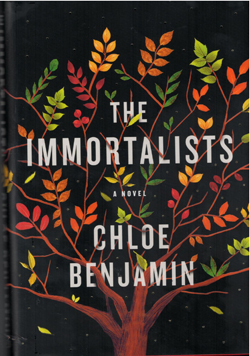The Immortalists by Chloe Benjamin; © 2018, G.P. Putnam’s Sons; ISBN 9780735-213180; 345 pages; $26.
By Donald H. Harrison

 SAN DIEGO – This is a story of four young Jewish siblings who visit a fortune teller in New York City, who tells them the exact dates that they will die. The woman’s predictions take root in the children’s minds, eventually to become obsessions. From that beginning, author Chloe Benjamin tells us what happened to each of the children, who later in life became respectively a ballet dancer, a magician, a doctor, and a medical research scientist.
SAN DIEGO – This is a story of four young Jewish siblings who visit a fortune teller in New York City, who tells them the exact dates that they will die. The woman’s predictions take root in the children’s minds, eventually to become obsessions. From that beginning, author Chloe Benjamin tells us what happened to each of the children, who later in life became respectively a ballet dancer, a magician, a doctor, and a medical research scientist.
I knew a young woman to whom a college acquaintance told her fortune. The acquaintance, reading Tarot cards, predicted that the young woman would “go crazy” by the time she was 30. This weighed heavily on the woman’s mind. She did not begin to stop worrying about it until she turned 31. Even after that, the thought would creep back into her mind, what if the Tarot Card reader was right about her fate, just wrong about how long it would take.
More recently I read a book by motivational speaker Eric Kaufmann who suggested that the danger that you concentrate on can act as a lure, even though you try to avoid it. For example, he wrote, if you are driving on a freeway next to an abutment, if you focus on the abutment instead of the road ahead, you’ll very likely drive into the abutment, even though you consciously were trying to avoid it.
So, you can imagine what a prediction of death on a date certain might have on young, very impressionable minds, as was the case in this novel. That prediction became a dominant, controlling factor in how they lived their lives. One became very reckless, another suicidal, another became bent on revenge, yet another tried to avoid any kind of danger.
In following each of their lives, readers will learn about the lives of gays in San Francisco during the 1970s, about the world of magic and illusion, and about the world of medical research on animals. The chapter about the doctor was less instructive about medical practice, because the doctor, in his obsession, spent much of his creative time trying to track down the fortune teller.
In its entirety, this novel moves quickly, builds suspense, and is thought provoking. I’d say those are wonderful qualities for any book.
*
Harrison is editor of San Diego Jewish World. He may be contacted via donald.harrison@sdjewishworld.com